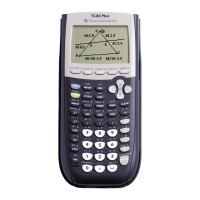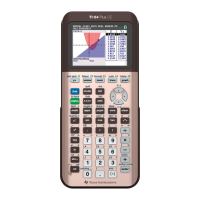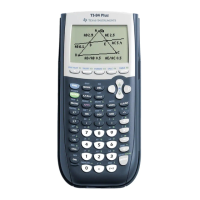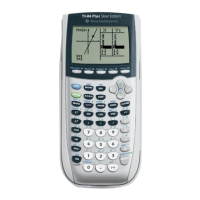Appendix A: Functions and Instructions 821
Nest
nInt()
to do multiple numeric integration.
Integration limits can depend on integration
variables outside them.
nInt(nInt(
e
^(ë xù y)/‡(x^2ì y^2),
y,ë x,x),x,0,1)
¸ 3.304
...
Note: See also
‰()
.
norm() MATH/Matrix/Norms menu
norm(
matrix
) ⇒
expression
Returns the Frobenius norm.
norm([a,b;c,d])
¸
añ +bñ +cñ +dñ
norm([1,2;3,4])
¸
30
not MATH/Test menu
not
Boolean expression1
⇒
Boolean expression
Returns true, false, or a simplified
Boolean
expression1
.
not 2>=3
¸ true
not x<2
¸ x
‚
2
not not innocent
¸ innocent
not
integer1
⇒
integer
Returns the one’s complement of a real integer.
Internally,
integer1
is converted to a signed, 32-bit
binary number. The value of each bit is flipped (0
becomes 1, and vice versa) for the one’s
complement. Results are displayed according to the
Base
mode.
You can enter the integer in any number base. For a
binary or hexadecimal entry, you must use the 0b or
0h prefix, respectively. Without a prefix, the integer
is treated as decimal (base 10).
If you enter a decimal integer that is too large for a
signed, 32-bit binary form, a symmetric modulo
operation is used to bring the value into the
appropriate range.
In Hex base mode:
not 0h7AC36 ¸ 0hFFF853C9
In Bin base mode:
0b100101 4 dec ¸ 37
not 0b100101 ¸
0b11111111111111111111111111011010
ans(1) 4 dec ¸ ë 38
Note: A binary entry can have up to 32 digits
(not counting the 0b prefix). A hexadecimal
entry can have up to 8 digits.
Note: To type the
4
conversion operator, press
2 p
. You can also select base conversions
from the
MATH/Base
menu.
nPr() MATH/Probability menu
nPr(
expression1
,
expression2
) ⇒
expression
For integer
expression1
and
expression2
with
expression1
‚
expression2
‚
0,
nPr()
is the number of
permutations of
expression1
things taken
expression2
at a time. Both arguments can be integers or
symbolic expressions.
nPr(
expression,
0
) ⇒
1
nPr(
expression, negInteger
) ⇒
1/((
expression
+1)
ø
(expression
+2)
...
(
expression
ì
negInteger
))
nPr(
expression, posInteger
) ⇒
expression
ø
(
expression
ì
1)
...
(
expression
ì
posInteger
+1)
nPr(
expression, nonInteger
)
⇒
expression
!/
(
expression
ì
nonInteger
)!
nPr(z,3)
¸ zø (zì 2)ø (zì 1)
ans(1)|z=5
¸ 60
nPr(z,ë 3)
¸
1
(z+1)ø (z+2)ø (z+3)
nPr(z,c)
¸
z!
(zì c)!
ans(1)ù nPr(zì c,ë c)
¸ 1
nPr(
list1
,
list2
) ⇒
list
Returns a list of permutations based on the
corresponding element pairs in the two lists. The
arguments must be the same size list.
nPr({5,4,3},{2,4,2})
¸
{20 24 6}
Important: Zero, not the letter O.

